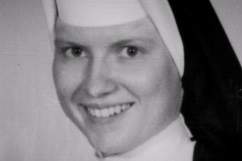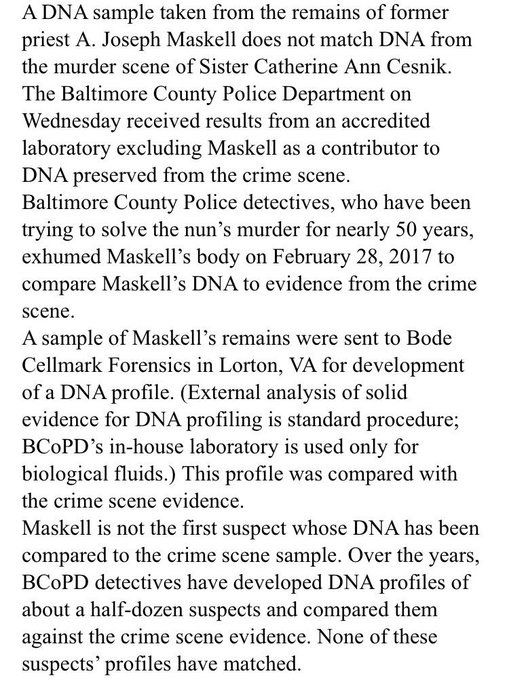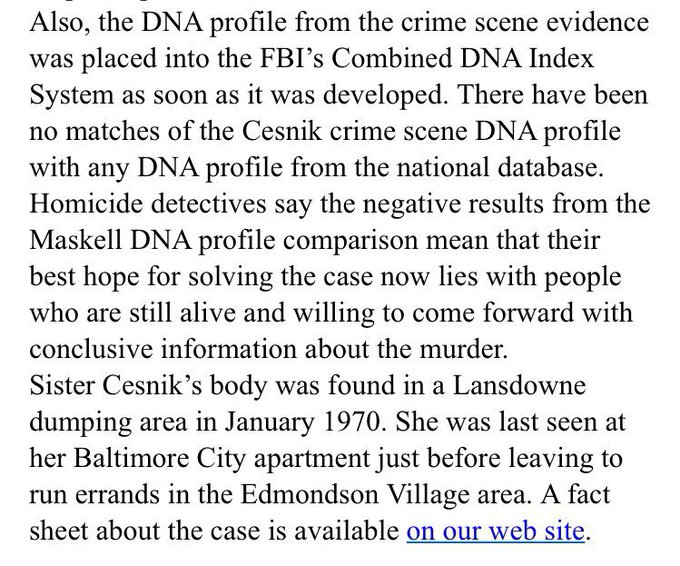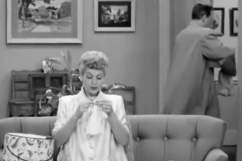In January 1970, Sister Cathy Cesnik’s brutally mutilated body was found in a field in Lansdowne, Maryland, two months after she’d been reported missing from her apartment in Southwest Baltimore.
The case went unsolved for decades. Then, in the 1990s, several former students from Archbishop Keough High School, where Cesnik worked as an English teacher, came forward, claiming that they’d be sexually abused by the school’s chaplain, Anthony Joseph Maskell. They said they’d confided in Cesnik, and believed she was dead because she threatened to report Maskell to the police.
The former high school chaplain is heavily featured in Netflix’s new true-crime docuseries, The Keepers, which people are already calling the next Making a Murderer. Read on to learn about Father Joseph Maskell and his involvement in the case, which remains unsolved to this day.
1. He Was the Chaplain of the High School Where Sister Cesnik Worked
On the evening of November 7, 1969, Sister Cathy Cesnik went to Edmondson Village Shopping Center to buy an engagement gift for her sister. At 11pm, Cesnik still hadn’t returned home, and her roommate, Helen Russell Phillips, called two priest friends. Together, the trio called the police and reported Cesnik as missing. In January, after nearly two months of investigation, Sister Cathy Cesnik’s body was discovered in a garage dump.
Sister Cathy Cesnik previously worked at Archbishop Keough High School in Baltimore, Maryland, where Father Joseph Maskell was the chaplain. Since her death, multiple former students have come forward, accusing Maskell of sexual abuse. These abuse victims say they confided in Cesnik, and that the teacher’s knowledge and potential threat to intervene in the matter is what led to her death.
Maskell was raised in northeast Baltimore and attended Calvert Hall College. According to the Baltimore Sun, he trained for the priesthood at St. Mary’s Seminary in Roland Park and was officially ordained in 1965. From 1967 to 1975, Maskell worked as the chaplain and counselor at Archbishop Kenough High School. He earned his Master’s Degree in school psychology from Towson State in 1972, and received his certificate of advanced study in counseling from Johns Hopkins University. Maskell was a well-known figure in Baltimore at the time of Cesnik’s murder. He was the chaplain for the Baltimore County police, the Maryland State Police, and the Maryland National Guard, according to the Huffington Post.
2. He Was the Subject of Multiple Sexual Abuse Allegations
The first sexual abuse claim against Maskell surfaced in 1992. According to News Week, the victim had suppressed the violent memories for over two decades, and in 1994, she became part of a $40 million civil lawsuit against the high school chaplain. The outlet writes, “[Jane] Doe claimed she was repeatedly raped by Maskell in his office under the guise that he was cleansing her of her sins. She said she had confided in a teacher, Cesnik, who told her she would ‘take care of it.'”
The civil suit motivated many other women to come forward with allegations of abuse. Father Magnus, another priest at the high school, was also named in these accusations. News Week reports that Jane Roe, the co-plaintiff in the lawsuit, said that Maskell would invite other men, “including police officers”, to take part in the abuse.
The man assigned to Cenik’s initial disappearance was a 28-year-old homicide detective named Nick Giangrosso. Giangrasso is reported by Inside Baltimore as saying, “The Catholic Church had a lot of input into the police department. A lot of power.”
The Baltimore Archdiocese’s statement that was obtained by Romper, however, claims that Father Maskell was never considered a suspect in Cesnik’s murder. “He was interviewed once. One of the victims claimed that she had a recovered memory of his involvement in her death, but he was interviewed and never charged.” In 1992, he was removed from his job as the pastor of Holy Cross Church in Baltimore because of the accusations. Until his death in 2001, Maskell denied all allegations of sexual misconduct.
3. He Died in 2001 at Age 62
Inside Baltimore describes Maskell as a “burly, charismatic priest” who had worked as the chief spiritual and psychological counsel at the high school for two years. The outlet also reports that he had a close relationship with many Keough parents– he’d baptized many of their children.
In 1994, Maskell visited the Institute of Living in Hartford, Connecticut, where an “an evaluation found no psychological or sexual abnormalities.” That July, he sought out counseling in the face of mounting allegations of abuse. According to The Baltimore Sun, at least a dozen women said he’d abused them during their time at Archbishop Keough. In February 1995, Maskell’s priestly duties were permanently revoked.
In 2001, Maskell died from the effects of a stroke at St. Joseph’s Hospital, according to Inside Baltimore. He was 62.
4. Baltimore County Police Announced This Week That Maskell’s DNA Does Not Match Evidence From the Crime Scene
In February, Maskell’s remains were exhumed at Holy Family Cemetery in Randallstown so that police could compare his DNA to that of the DNA found at Cesnik’s crime scene. On Wednesday, they revealed that the DNA sample taken from the former chaplain does not match evidence from Sister Catherine Ann Cesnik’s murder.
Police spokesperson Elise Armacost, however, says these results do not clear Maskell as a suspect in the case, according to the Baltimore Sun.
Armacost tells the outlet, “For now, we’ve pretty well reached the end of the road when it comes to forensic evidence… Our best hope for solving this case at this point lies with the people who are still alive. And we hope that someone will be able to come forward with conclusive information about the murder.”
5. A Former Student Claims Maskell Showed Her Cesnik’s Body Before It Was Discovered by Hunters in January 1970
According to a 2015 Huffington Post article, Maskell invited 16-year-old high school junior Jean Hargadon Wehner on a drive in November 1969. The outlet reports that it wasn’t odd for Maskell to drive his students home or take them to doctor’s appointments during the school day.
Wehner says that Maskell drove her to a wooded area, and when the two exited the car, she saw her teacher’s lifeless body on the ground. “I knew it was her,” she recalled to the Huffington Post. “She wasn’t that far gone that you couldn’t tell it was her.”
Wehner claims Maskell then leaned down to her and said, “You see what happens when you say bad things about people?” Horrified of the threat, she decided to keep it to herself. “He terrified me to the point that I would never open my mouth,” Wehner tells the Huffington Post.
It wasn’t for another two months that hunters came across Cesnik’s body and called police.




